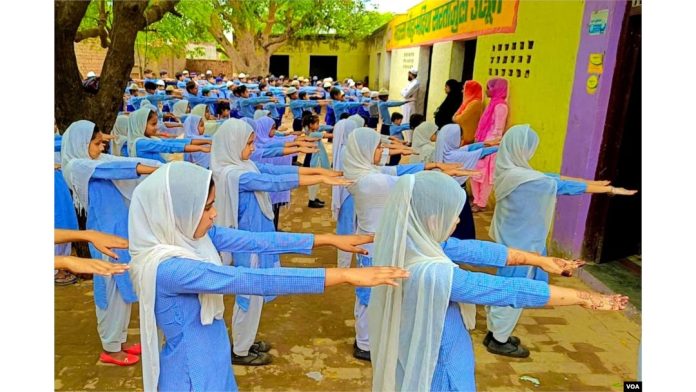New Delhi, Apr 4: Muslims in India’s most populous state, Uttar Pradesh, are rallying against a recent court ruling that threatens to shutter thousands of religious schools known as madrasas, integral institutions of Islamic education in the region.
On March 22, the Allahabad High Court overturned the Uttar Pradesh Board of Madrasa Education Act 2004, citing a breach of India’s constitutional secularism. The ruling mandates the transfer of Islamic school students to “regular” schools, prompting widespread outcry among the Muslim community.
Leaders of the ruling Bharatiya Janata Party (BJP) argue that this move will benefit Muslim society by integrating students into modern mainstream schools. However, Muslim leaders vehemently oppose the decision, citing years of successful reforms that have modernized madrasas and introduced nationally approved syllabuses encompassing subjects like physics, chemistry, mathematics, computer programming, and social sciences.
Dr. Zafarul-Islam Khan, former chairman of the Delhi Minorities Commission, criticized the ruling for disregarding Articles 29 and 30 of the Indian Constitution, which safeguard the rights of religious minorities to establish and operate educational institutions of their choice. He emphasized the positive impact of modernized madrasas, where students have excelled and pursued careers in various fields.
The court’s ruling directly affects around 16,500 recognized madrasas, their 1.95 million students, and 100,000 teachers, including non-Muslims, primarily Hindus. Moreover, it poses a threat to all 25,000 recognized and unrecognized madrasas in Uttar Pradesh, serving 2.7 million students taught by 140,000 teachers.
Despite assertions from the court that madrasa education lacks quality and universality, recognized madrasa teachers argue otherwise, pointing to adherence to the syllabus established by the National Council of Educational Research and Training (NCERT) since 2018.
Ajaz Ahmad, president of UP’s Islamic Madrasa Modernization Teachers Association, emphasized the modernization efforts undertaken by madrasas and expressed concern over potential job losses for thousands of teachers.
Babu Ram, a Hindu science teacher at a modernized madrasa, highlighted the success of federal schemes aimed at improving madrasa education and increasing enrollment among Muslim children.
Critics argue that the closure of madrasas would not only increase the dropout rate among Muslims but also undermine the community’s access to holistic education, integrating religious and secular knowledge.
Furthermore, Muslims in India have long faced discrimination, with concerns heightened since the rise of the Hindu nationalist agenda under Prime Minister Narendra Modi’s administration in 2014.
Alok Vats, a senior BJP leader, dismissed allegations of an anti-Muslim agenda, asserting the party’s concern for the welfare of Muslim children. However, concerns remain regarding the fate of madrasa teachers and the impact of the ruling on religious freedom and minority rights.
As Muslims in India continue to voice their opposition, the future of madrasa education and the broader implications for religious minorities remain uncertain.




